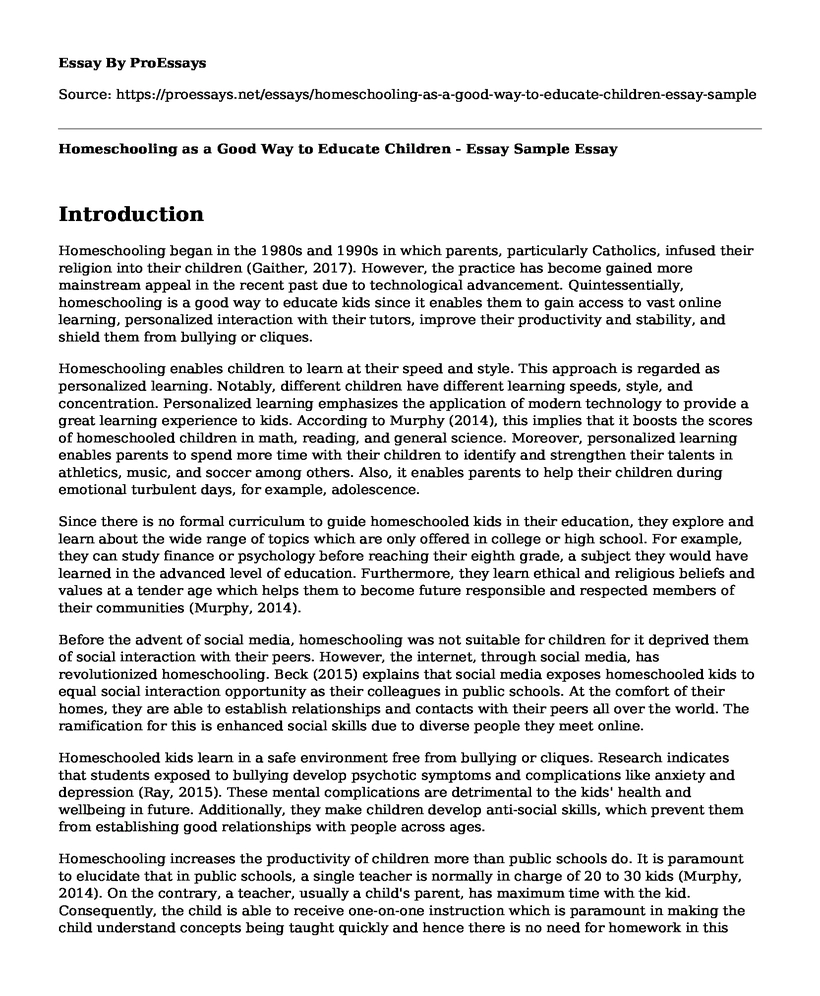Introduction
Homeschooling began in the 1980s and 1990s in which parents, particularly Catholics, infused their religion into their children (Gaither, 2017). However, the practice has become gained more mainstream appeal in the recent past due to technological advancement. Quintessentially, homeschooling is a good way to educate kids since it enables them to gain access to vast online learning, personalized interaction with their tutors, improve their productivity and stability, and shield them from bullying or cliques.
Homeschooling enables children to learn at their speed and style. This approach is regarded as personalized learning. Notably, different children have different learning speeds, style, and concentration. Personalized learning emphasizes the application of modern technology to provide a great learning experience to kids. According to Murphy (2014), this implies that it boosts the scores of homeschooled children in math, reading, and general science. Moreover, personalized learning enables parents to spend more time with their children to identify and strengthen their talents in athletics, music, and soccer among others. Also, it enables parents to help their children during emotional turbulent days, for example, adolescence.
Since there is no formal curriculum to guide homeschooled kids in their education, they explore and learn about the wide range of topics which are only offered in college or high school. For example, they can study finance or psychology before reaching their eighth grade, a subject they would have learned in the advanced level of education. Furthermore, they learn ethical and religious beliefs and values at a tender age which helps them to become future responsible and respected members of their communities (Murphy, 2014).
Before the advent of social media, homeschooling was not suitable for children for it deprived them of social interaction with their peers. However, the internet, through social media, has revolutionized homeschooling. Beck (2015) explains that social media exposes homeschooled kids to equal social interaction opportunity as their colleagues in public schools. At the comfort of their homes, they are able to establish relationships and contacts with their peers all over the world. The ramification for this is enhanced social skills due to diverse people they meet online.
Homeschooled kids learn in a safe environment free from bullying or cliques. Research indicates that students exposed to bullying develop psychotic symptoms and complications like anxiety and depression (Ray, 2015). These mental complications are detrimental to the kids' health and wellbeing in future. Additionally, they make children develop anti-social skills, which prevent them from establishing good relationships with people across ages.
Homeschooling increases the productivity of children more than public schools do. It is paramount to elucidate that in public schools, a single teacher is normally in charge of 20 to 30 kids (Murphy, 2014). On the contrary, a teacher, usually a child's parent, has maximum time with the kid. Consequently, the child is able to receive one-on-one instruction which is paramount in making the child understand concepts being taught quickly and hence there is no need for homework in this setting.
Conclusion
In general, homeschooling is vital for children in the contemporary world. Essentially, it promotes a child's social, physical, and emotional development compared to the conventional public schooling. It enhances a child's right to choose what to study and how to achieve the learning process. In addition, it exposes a child to little or no future mental complications that accompany bullying in schools. Moreover, it improves their stability and productivity as far as learning is concerned. In this regard, homeschooling should be encouraged as a modest way to educate kids in modern society.
ReferencesBeck, C. W. (2015). Home education and social integration. In International Perspectives on Home Education (pp. 87-98). Palgrave Macmillan, London.
Gaither, M. (2017). Homeschooling in the United States: A review of select research topics. Pro-Posicoes, 28(2), 213-241.
Murphy, J. (2014). The social and educational outcomes of homeschooling. Sociological Spectrum, 34(3), 244-272.
Ray, B. (2015). African American homeschool parents' motivations for homeschooling and their Black children's academic achievement. Journal of School Choice, 9(1), 71-96.
Cite this page
Homeschooling as a Good Way to Educate Children - Essay Sample. (2022, Nov 04). Retrieved from https://proessays.net/essays/homeschooling-as-a-good-way-to-educate-children-essay-sample
If you are the original author of this essay and no longer wish to have it published on the ProEssays website, please click below to request its removal:
- Should Adderall Be Used as a Performance Enhancing Drug for College Students?
- Cultural Comparison of Bilingualism and Its Effects
- Professional Relationships With Children Essay Example
- Autobiography Study
- 1960s-70s New Left: Activists Fighting for Social Change - Essay Sample
- Article Review on Exploitative Institutions: Misaligned with Students' Efforts
- Essay Example on CDC: Keeping Americans Healthy through Research and Prevention







